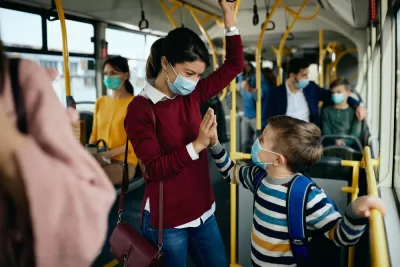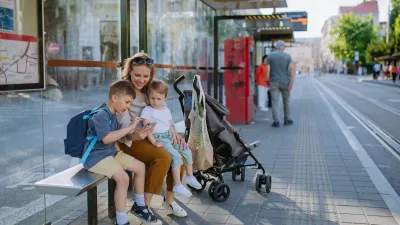Public transit can often be inconvenient or unsafe for people with children in strollers and riders traveling for purposes other than commuting. Agencies are working on ways to fix that.

Transit agencies face a variety of challenges, particularly post-pandemic. For some riders, the lack of family-friendly features and amenities makes transit more difficult or impossible. As H. Jiahong Pan explains in Next City, “These agencies are slow to make changes to ensure women and families feel welcome on public transit, whether through policy, service or seating layout adjustments.”
While most transit planners view public transit through the lens of commuting, Investing in Place’s Jessica Meaney explains that “Other countries have really widened that perspective to look at how we get kids to school, how we get people to health care, how we get to the grocery store, how we get to the park, how we live our lives.” According to a 2019 report from the Los Angeles Metropolitan Transportation Authority, “women, who travel predominately for household chores, school or daycare, and often while caring for other people, bore the brunt of transportation costs and harassment yet received the least help.”
L.A. Metro has pledged to support families through its Gender Action Plan. “The plan calls for collecting data disaggregated by gender to understand how policy changes would affect people of different genders; building out restrooms with specific amenities; prioritizing household-serving entities such as grocery stores and childcare at transit stations, providing real-time arrival and bus crowding information; and following in Tri Delta Transit’s footsteps in redesigning buses’ seating layout to support riders who bring aboard unfolded strollers.”
Other agencies around the country are taking actions to make transit easier and safer for women, children, and other vulnerable users, changing stroller policies and making bus service more frequent during non-rush hours.
FULL STORY: Transit Agencies Are Taking Small Steps Toward Family-Friendly Systems

Maui's Vacation Rental Debate Turns Ugly
Verbal attacks, misinformation campaigns and fistfights plague a high-stakes debate to convert thousands of vacation rentals into long-term housing.

Planetizen Federal Action Tracker
A weekly monitor of how Trump’s orders and actions are impacting planners and planning in America.

Chicago’s Ghost Rails
Just beneath the surface of the modern city lie the remnants of its expansive early 20th-century streetcar system.

Bend, Oregon Zoning Reforms Prioritize Small-Scale Housing
The city altered its zoning code to allow multi-family housing and eliminated parking mandates citywide.

Amtrak Cutting Jobs, Funding to High-Speed Rail
The agency plans to cut 10 percent of its workforce and has confirmed it will not fund new high-speed rail projects.

LA Denies Basic Services to Unhoused Residents
The city has repeatedly failed to respond to requests for trash pickup at encampment sites, and eliminated a program that provided mobile showers and toilets.
Urban Design for Planners 1: Software Tools
This six-course series explores essential urban design concepts using open source software and equips planners with the tools they need to participate fully in the urban design process.
Planning for Universal Design
Learn the tools for implementing Universal Design in planning regulations.
planning NEXT
Appalachian Highlands Housing Partners
Mpact (founded as Rail~Volution)
City of Camden Redevelopment Agency
City of Astoria
City of Portland
City of Laramie





























